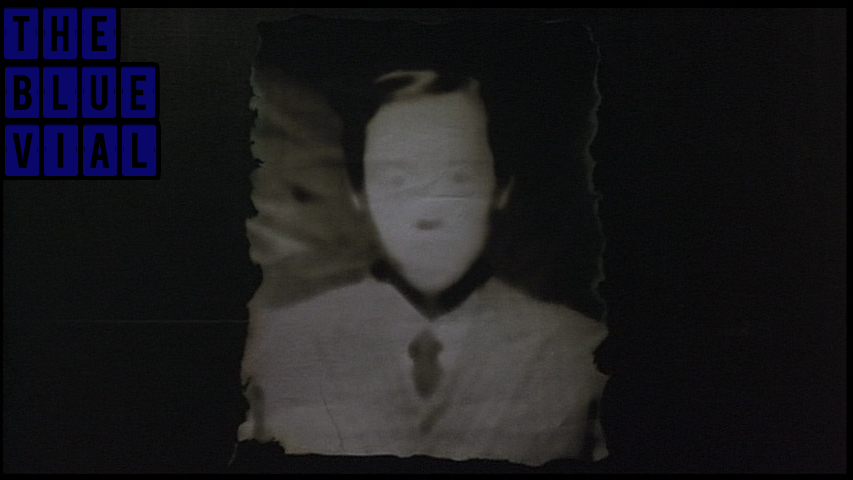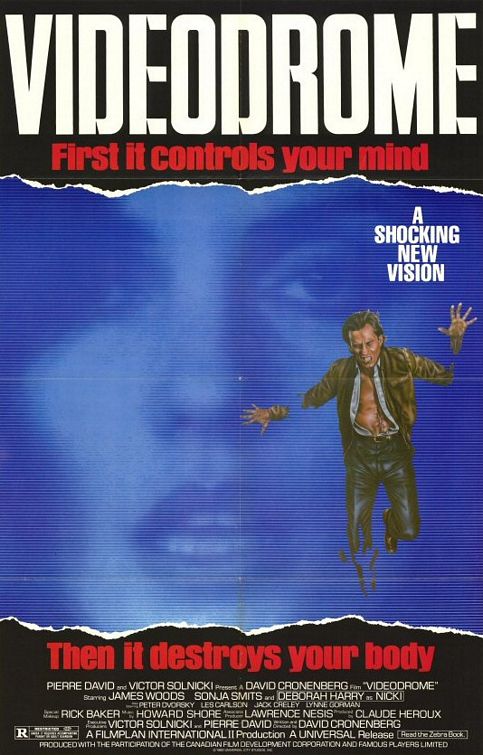
"When I was driving, nothing could hurt me anymore."
"Then you met me."
"And then I met you."
-Jim Nashe and Jack Pozzi in The Music of Chance
-Jim Nashe and Jack Pozzi in The Music of Chance
As the title suggests, chance in life plays so often like music, having a melody and it's own distinct rhythm. It can be a lush and symphonic presence, with fast, aggressive tempos and overwhelming crescendos. Oftentimes it is slow and monotonous, leaving you to wonder where all the years and opportunities have gone. But it is always there, a constant. Keep your eyes open and your head on straight, The Music of Chance warns us, before chance thrusts you into a situation of unthinkable absurdity, created entirely of your own making and at the same time completely out of your hands.
The film begins as we follow Jim Nashe (Many Patinkin), driving through a scenic stretch of an unnamed state. He passes Jack Pozzi (James Spader) on the side of the road. Pozzi is beaten, bruised, and caked with dry blood. Nashe offers him a ride. Pozzi, a card shark, was in a poker game and cleaning up, before thieves robbed everyone and left him broke. Too bad, he tells Nashe, he had a scheduled poker game in a few days with a couple of clueless, rich businessmen. It was a guranteed major pay day. He needs at least 10 grand to sit down in the game, and after thinking it over, Nashe decides he's going to back Pozzi with the last bit of money he has to his name. It's a compelling start to this seemingly straight story, providing intentional ambiguity in Patinkin's character. Why does he have almost 100,000 miles on his car if he bought it brand new less than a year ago? What does he do exactly? Why is he so anxious to give Pozzi (a less than savory character in both appearance and attitude) his trust and money?
The pair arrive at the mansion of the two businessmen for the game. They are Mr. Flower (Charles During) and Mr. Stone (Joel Grey, appearing as sinister as ever). They hit the lottery years ago and through big business are making more money than they ever dreamed. Pozzi and Nashe take a tour of their opulent estate, and here is where things start getting a little weird. They are introduced to a large scale model occupying a single room, referred to as The City of the World. "Everything in it happens at once" explains Stone. Contained within the model are little figures of Flower and Stone at different points and landscapes in their lives, existing at the same time. The City of the World also has a few other creepy touches, such as a prison where all of the prisoner figures have smiles on their faces and "can't wait to be rehabilitated". They explain a space cleared on the portion of the model representing their current property for a wall they aspire to build, or rather a monument in the shape of a wall. "A wall of 10,000 stones" Stone himself says through a creepy self-referential gaze. It is an eerie scene, and well establishes the mood of unpredictability that will ripple throughout the rest of the story.
And then the poker game begins. "We took lessons" Stone proudly proclaims, and it shows. The pair clean out Pozzi and Nashe for everything they have and more. Before we know it, they are stuck in way over their heads, owing an ammount they can't possibly pay off. Flower refuses to take credit from the pair, and a quick brainstorming session ensues. With no money or possessions, how can they possibly settle the debt? "There's always the wall" says Stone, "Someone has to build it."
To say anything more would be doing a disservice to this film, which has a remarkably refreshing impact stemming from it's wholly unpredictable plot developments and character revelations. It's just not everyday you come across a movie where you truly have no idea what's coming next, and it is out of this quality that The Music of Chance takes on a kind of hectic ebb and flow that, despite (or maybe even because of) the absurdity, gives it the feeling of life itself. And make no mistake about it, the plot is absurd. You could argue perfectly reasonably that there is no one in their right mind who would endure the impossible situation that Nashe and Pozzi find themselves in. And yet the film hits the right note time and again because at its heart it's not really interested in the circumstances. It's interested in its characters and how they handle themselves admist the chaos and ever evolving conditions. In the world of The Music of Chance, there is no destiny, no kismet. Only people and chance occurences. Random roadside meets and the turn of a card. And when it rains, it pours.
Director Philip Haas and his wife adapted their screenplay from a novel by Paul Auster which remains unread by me. The great crime perpetrated against The Music of Chance is that it has, to this day, never received a DVD release in America, and thus until it does so will remain unseen by all except the few who have the means to purchase and watch the UK disc or those lucky enough to catch an ultra-rare once in a blue moon cable broadcast. This is one of the great, unsung films of the 1990's, a work of deranged affirmation that certainly deserves to be seen by many. Cross your fingers that one day this gem will receive a proper release.



The film begins as we follow Jim Nashe (Many Patinkin), driving through a scenic stretch of an unnamed state. He passes Jack Pozzi (James Spader) on the side of the road. Pozzi is beaten, bruised, and caked with dry blood. Nashe offers him a ride. Pozzi, a card shark, was in a poker game and cleaning up, before thieves robbed everyone and left him broke. Too bad, he tells Nashe, he had a scheduled poker game in a few days with a couple of clueless, rich businessmen. It was a guranteed major pay day. He needs at least 10 grand to sit down in the game, and after thinking it over, Nashe decides he's going to back Pozzi with the last bit of money he has to his name. It's a compelling start to this seemingly straight story, providing intentional ambiguity in Patinkin's character. Why does he have almost 100,000 miles on his car if he bought it brand new less than a year ago? What does he do exactly? Why is he so anxious to give Pozzi (a less than savory character in both appearance and attitude) his trust and money?
The pair arrive at the mansion of the two businessmen for the game. They are Mr. Flower (Charles During) and Mr. Stone (Joel Grey, appearing as sinister as ever). They hit the lottery years ago and through big business are making more money than they ever dreamed. Pozzi and Nashe take a tour of their opulent estate, and here is where things start getting a little weird. They are introduced to a large scale model occupying a single room, referred to as The City of the World. "Everything in it happens at once" explains Stone. Contained within the model are little figures of Flower and Stone at different points and landscapes in their lives, existing at the same time. The City of the World also has a few other creepy touches, such as a prison where all of the prisoner figures have smiles on their faces and "can't wait to be rehabilitated". They explain a space cleared on the portion of the model representing their current property for a wall they aspire to build, or rather a monument in the shape of a wall. "A wall of 10,000 stones" Stone himself says through a creepy self-referential gaze. It is an eerie scene, and well establishes the mood of unpredictability that will ripple throughout the rest of the story.
And then the poker game begins. "We took lessons" Stone proudly proclaims, and it shows. The pair clean out Pozzi and Nashe for everything they have and more. Before we know it, they are stuck in way over their heads, owing an ammount they can't possibly pay off. Flower refuses to take credit from the pair, and a quick brainstorming session ensues. With no money or possessions, how can they possibly settle the debt? "There's always the wall" says Stone, "Someone has to build it."
To say anything more would be doing a disservice to this film, which has a remarkably refreshing impact stemming from it's wholly unpredictable plot developments and character revelations. It's just not everyday you come across a movie where you truly have no idea what's coming next, and it is out of this quality that The Music of Chance takes on a kind of hectic ebb and flow that, despite (or maybe even because of) the absurdity, gives it the feeling of life itself. And make no mistake about it, the plot is absurd. You could argue perfectly reasonably that there is no one in their right mind who would endure the impossible situation that Nashe and Pozzi find themselves in. And yet the film hits the right note time and again because at its heart it's not really interested in the circumstances. It's interested in its characters and how they handle themselves admist the chaos and ever evolving conditions. In the world of The Music of Chance, there is no destiny, no kismet. Only people and chance occurences. Random roadside meets and the turn of a card. And when it rains, it pours.
Director Philip Haas and his wife adapted their screenplay from a novel by Paul Auster which remains unread by me. The great crime perpetrated against The Music of Chance is that it has, to this day, never received a DVD release in America, and thus until it does so will remain unseen by all except the few who have the means to purchase and watch the UK disc or those lucky enough to catch an ultra-rare once in a blue moon cable broadcast. This is one of the great, unsung films of the 1990's, a work of deranged affirmation that certainly deserves to be seen by many. Cross your fingers that one day this gem will receive a proper release.
























